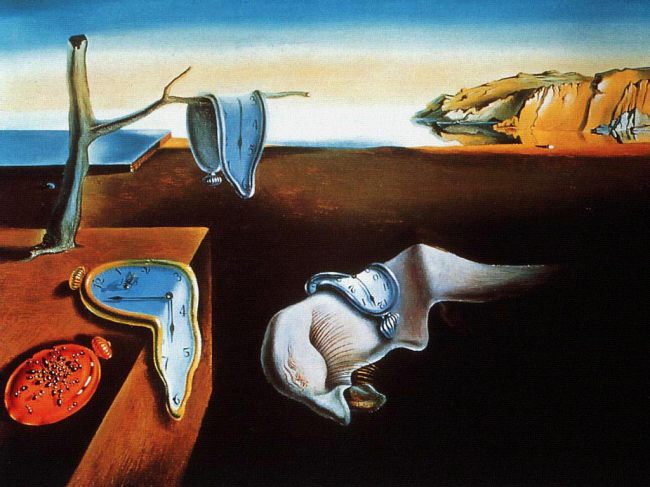 |
Salvador Dalí`s masterpiece, The Persistence of Memory, 1931. (AP) |
Excessive eating and drinking disrupts the body‘s clock similar to jet lag, U.S. researchers say.
Dr. Louis Ptacek of the University of California, San Francisco, who is a Howard Hughes Medical Institute investigator, said the protein PKC is critical in resetting the food clock if eating habits change.
The study, published in the journal Proceedings of the National Academy of Sciences, showed normal laboratory mice given food only during their regular sleeping hours would adjust their food clock over time and begin to wake up from their slumber, and run around in anticipation of their new mealtime.
However, the mice lacking the PKC gene were not able to respond to changes in their meal time -- instead they slept right through the meal.
In most organisms, biological clockworks are governed by a master clock, referred to as the “circadian oscillator,” which keeps track of time and coordinates biological processes with the rhythm of a 24-hour cycle of day and night.
The findings have implications for understanding the molecular basis of diabetes, obesity and other metabolic syndromes because a desynchronized food clock may serve as part of the pathology underlying these disorders, Ptacek said. (UPI)
<관련 한글 기사>
과식, 과음하면 시간감각도 ‘오락가락’
과식이나 과음을 하면 시차 적응할 때와 같이 체내의 시간 감각이 흐트러진다는 연구 결과가 미국에서 나왔다.
미국 샌프란시스코 캘리포니아대학교의 루이스 파섹 교수는 식습관이 바뀔 때 PKC 단백질이라는 요소가 작용해 음식 섭취시간을 조절하는 우리 신체의 시간 감각을 바꿔 놓는다고 밝혔다.
파섹 교수가 실험용 쥐를 대상으로 실시한 연구 결과 일반적으로 쥐들이 잠자는 시간에만 음식을 줘 음식을 섭취하는 시간 감각을 재조정하면 자는 중에 잠을 깨 식사를 할 시간이라고 인지한 쥐들이 분주히 움직이는 것이 확인됐다.
그러나 PKC 유전자 요소가 없는 쥐들의 경우 이와 같은 식사 시간의 변화에 반응하지 않았고 음식을 주었음에도 바로 잠을 자는 결과가 관찰됐다.
대부분의 생물들의 경우 생체 시계는 ‘생체주기 진동자(circadian oscillator)’라고 지칭 되는 시간 감각 조절 능력에 의해 지배된다.
이번 연구 결과는 식사 시간을 인지하는 체내 시계가 흐트러지면 당뇨, 비만 및 기타 신진대사 이상을 가져온다는 사실을 이해할 수 있는 실마리를 제공하고 있다. (코리아헤럴드)








![[Today’s K-pop] Blackpink’s Jennie, Lisa invited to Coachella as solo acts](http://res.heraldm.com/phpwas/restmb_idxmake.php?idx=644&simg=/content/image/2024/11/21/20241121050099_0.jpg)